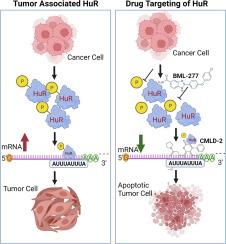Advanced Drug Delivery Reviews ( IF 15.2 ) Pub Date : 2022-07-08 , DOI: 10.1016/j.addr.2022.114442 Mrinmoyee Majumder 1 , Paramita Chakraborty 2 , Sarumathi Mohan 1 , Shikhar Mehrotra 2 , Viswanathan Palanisamy 1

|
The control of eukaryotic gene expression occurs at multiple levels, from transcription to messenger RNA processing, transport, localization, turnover, and translation. RNA-binding proteins control gene expression and are involved in different stages of mRNA processing, including splicing, maturation, turnover, and translation. A ubiquitously expressed RBP Human antigen R is engaged in the RNA processes mentioned above but, most importantly, controls mRNA stability and turnover. Dysregulation of HuR is linked to many diseases, including cancer and other immune-related disorders. HuR targets mRNAs containing AU-rich elements at their 3′untranslated region, which encodes proteins involved in cell growth, proliferation, tumor formation, angiogenesis, immune evasion, inflammation, invasion, and metastasis. HuR overexpression has been reported in many tumor types, which led to a poor prognosis for patients. Hence, HuR is considered an appealing drug target for cancer treatment. Therefore, multiple attempts have been made to identify small molecule inhibitors for blocking HuR functions. This article reviews the current prospects of drugs that target HuR in numerous cancer types, their mode of action, and off-target effects. Furthermore, we will summarize drugs that interfered with HuR-RNA interactions and established themselves as novel therapeutics. We will also highlight the significance of HuR overexpression in multiple cancers and discuss its role in immune functions. This review provides evidence of a new era of HuR-targeted small molecules that can be used for cancer therapeutics either as a monotherapy or in combination with other cancer treatment modalities.
中文翻译:

HuR 作为癌症治疗和免疫相关疾病的分子靶点
真核基因表达的控制发生在多个水平上,从转录到信使RNA加工、运输、定位、周转和翻译。RNA 结合蛋白控制基因表达,并参与 mRNA 加工的不同阶段,包括剪接、成熟、周转和翻译。普遍表达的 RBP 人类抗原 R 参与上述 RNA 过程,但最重要的是控制 mRNA 稳定性和更新。HuR 失调与许多疾病有关,包括癌症和其他免疫相关疾病。HuR 靶向 3'非翻译区含有富含 AU 元件的 mRNA,编码参与细胞生长、增殖、肿瘤形成、血管生成、免疫逃避、炎症、侵袭和转移的蛋白质。据报道,HuR 在许多肿瘤类型中过度表达,导致患者预后不良。因此,HuR 被认为是癌症治疗的一个有吸引力的药物靶点。因此,人们进行了多次尝试来鉴定用于阻断 HuR 功能的小分子抑制剂。本文回顾了针对多种癌症类型的 HuR 药物的当前前景、其作用方式和脱靶效应。此外,我们将总结干扰 HuR-RNA 相互作用并确立其新型疗法的药物。我们还将强调 HuR 过度表达在多种癌症中的重要性,并讨论其在免疫功能中的作用。









































 京公网安备 11010802027423号
京公网安备 11010802027423号